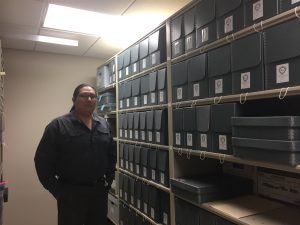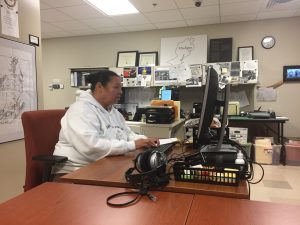
by Jessica Hoffman
A vast complex sits apart from a main road on the Cape, housing the Mashpee Wampanoag Indian Community and Government Center. Nicknamed “The Castle,” the new building is a state-of-the-art asset, layered with modern architecture, security guards, and restricted access rooms. The building represents quite an upgrade from the Tribal Council’s previous home: a modest cottage donated by a local homeowner. But it can also seem an overwhelming, or even intimidating, change.
But tucked into the basement of The Castle is the Mashpee Wampanoag Tribal Archives, an archives whose outreach and advocacy success depends on building trust with the people it serves.
Stephen R. Curley is the tribe’s first archivist. When he was hired two years ago, the Tribe handed off a room full of boxes, some basic infrastructure, and a set of operational benchmarks. Since then, he has created a functioning archives from scratch: learning about his holdings, identifying their strengths and weaknesses, cataloguing, digitizing, and creating collections.
Curley admits to being surprised and impressed by his progress. “I’ve built it from the ground up. I’m still building. You need to build up an archive before you can do all the community outreach. That way you can show people what you are doing and how their materials will be treated…We want to have our materials in great condition before we display them. It makes a huge difference… People wonder what to do with their own collections. If they know us and trust us and know we will preserve their collections properly they will turn to us.”
While gaining physical and intellectual control of the Tribe’s holdings has been daunting but achievable, gaining the trust of the tribal community of the community has proven to be a much more difficult challenge.
NEW ARCHIVIST IN TOWN

Originally from Arizona, Curley began his career as an anthropologist. However, he realized he wanted to focus his energies on something less esoteric and more concrete. He wanted to make a difference. In shifting to the field of archives, he hoped to work with tribes to develop and decolonize institutions, better suiting them to the needs of the tribes they serve.
For Curley, the Mashpee Wampanoag Archives was the perfect opportunity. “There wasn’t anything better I could have picked,” he declared. “Tribal archives help lead to tribal sovereignty…but the idea of a tribal archive is still nascent. Not many tribes have their own archives. And they are mostly community based. This is something that isn’t the norm.”
But, he is an outsider in the Mashpee Wampanoag community, a community with a hearty distrust of institutionalization and concerns about the historical exclusion, misrepresentation, and abuse of Native American tribes by academic institutions.
“People have a lot of mistrust and misconceptions… That trust dynamic… It’s a big piece in creating a viable archive. We want people to know that they can trust us to keep their family collections here and that we’ll try to curate them respectfully and we won’t just have other tribal members take things out. Because that’s happened before in other tribal settings.”
BUY-IN
But the Tribal Archives relies on more than just community trust. Trust of the Tribal institutions and infrastructure is critical. And it is something Curley has worked hard to cultivate.
Curley has advocated for his archives since the moment he arrived, building relationships within the Tribal Government itself. He speaks regularly with the tribe’s chief, recording interviews for the future. He also uses these meetings to ground himself in the history of the tribe — a critical part of understanding his holdings and establishing himself as a trustworthy professional. He also works closely with the Tribe’s legal branch, assisting them with the research and records needed for their work.
Curley is also working hard to build relationships outside of the Mashpee community. He is actively reaching out to other institutions in the field, such as Harvard University, the Massachusetts State Archives, Amherst and others, in hopes of building partnerships that will allow the tribe to reclaim some of their historical material via digital surrogates. Curley views these relationships as critical, not only to help grow the Archives’ holdings, but also to help reunite the sovereign history of Tribes.
THE INCONVENIENT TRUTH
The Archivist often does not have final say or control over the Tribal Archives programming ideas. All programs and events are subject to approval by the tribe’s governing infrastructure and press office. And, they often want to avoid anything politically charged. It’s a recurring theme with some of Curley’s outreach ideas.
“The inconvenient truth of archives is internal bureaucracy and politics… Even though we’re just dealing with paper, it can be very political. There’s a bureaucracy that we sort of operate within,” he said.
For example, the tribe recently passed the 40th anniversary of their well-publicized land claim lawsuit. Curley proposed an event to mark the occasion: a screening of a well-balanced video followed by a panel discussion with key players from the trial and historical experts. Unfortunately, his idea was vetoed by the PR arm of the tribe. “It kind of just boiled down to it was ‘too political’ and they don’t want to dredge up bad feelings,” Curley explained.
THE SECRET WEAPON
Curley’s best community outreach tool may be his newest employee, Wasutu-Nopi (also known as Denise Kersey. Her love of history and interest in her family’s past inspired her to apply for the Elder Apprentice position in the archives. “I like seeing my relatives way back when.” When she was just eight, her grandmother died. Through her work, Wasutu-Nopi discovered pictures of her grandmother in her early twenties and “…to get to see her then is… oh wow.”
Wasutu-Nopi is a tribal elder, a distinguished position in the tribal community. Even more, she is well liked and trusted in the community. As a result, her presence and participation in the archives raises awareness of the archives amongst the tribe. “Lots of people didn’t know what (the Archives) was or why it was needed. Or even where it was,” Wasutu-Nopi said. But her work with the Archive has gone a long way towards strengthening community bonds.
FUTURE FACING
Thus-far, the Archives hasn’t done much community-facing outreach, focusing instead on intellectual control. However, both Curley and Wasutu-Nopi have lots of ideas for future programs.
Curley is planning to exhibit their holdings as much as possible. Both a blog and a Facebook page for the Archives have recently gone live. And Curley is committed to creating more online resources, such as an online catalogue of the Tribal Archives holdings. Currently, a small wall-mounted monitor near the Archives entrance cycles through a loop of various digitized images. Curley hopes to add more monitors, or perhaps iPads, with images throughout the building. Ideally, the pictures would not only cycle on a loop, but each picture would have description or content, identifying the people or activities seen in the photos. He’d also like to build a self-guided walking tour on a nearby trail, allowing people to wander the sites and view the timeline of the Wampanoag tribe and their history in Mashpee.
As October was Archives Awareness month, Curley also implemented several special programs to raise the Archives’ visibility. A temporary workstation installation in the rotunda of the Government Center, showcased the Archives’ catalog to a new audience. The Archives also collaborated with the Elders Department’s “Lunch & Learn” program, offering public tours of the space and holdings.
Curley wants his outreach efforts to not only build community trust, but also build the Tribal Archives holdings. The entire image collection of the Archives has been scanned and photographed. However, they have very little metadata. Curley wants to crowdsource as much information as he can by inviting community members to a social night where they can view some photos on a big screen — and hopefully match names to faces and scenes to events. He also plans to throw digitization parties, allowing community members to bring their old photos to the event to be digitized, and hopefully also be allowed to keep digitized copies for the Archives as well.
Wasutu-Nopi also has a vision for the future of the archives. “I’d like to have kids know what went on in the past. I’d love to have groups of kids coming in and they could see what went on during the Federal Recognition Process. It’s not an easy thing to understand. But they could sit around the table and look at pictures and connect. They could see how we make dreamcatchers, earrings, baskets, and we could tell them stories of the past.”
A lot of people in the community have “a notion that larger institutions don’t care about them.” says Curley. “We can change that… It’s a community archive, not just a governmental archive. It belongs to them. We exist to serve the tribe. And they have an expectation for us to do right by them and to be of use.”
To learn more about the Mashpee Wampanoag Tribal Archives visit:
Blog: https://mwthpd.wordpress.com/
To learn more about the Mashpee Wampanoag Tribe’s land claim lawsuit read:
Mashpee Indians: Tribe on Trial by Jack Campisi
